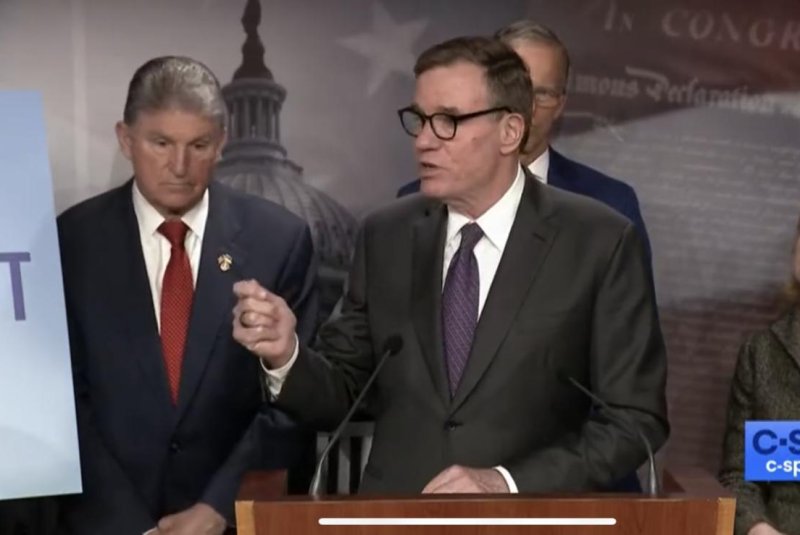Flanked by Republicans and Democrats, Sen. Mark Warner (at lectern) discusses the new proposal for countering any threat to U.S. national security posed by tech platforms such as TikTok. Screenshot via
C-SPAN
March 7 (UPI) -- Congressional lawmakers introduced a bill Tuesday in response to fears about the potential threat to U.S. national security posed by foreign-controlled tech platforms such as TikTok.
Senate Intelligence Committee Chair Sen. Mark Warner, D-Va., introduced the Restricting the Emergence of Security Threats that Risk Information and Communications Technology (RESTRICT) Act, which instructs the Department of Commerce to review, prevent, and mitigate information communications and technology transactions that pose risks to the United States and its citizens.
Flanked my lawmakers of both major political parties, Warner held a press conference Tuesday to explain the proposal's call for new regulations to restrict access to tech programs such as the wildly popular TikTok, which is owned by the China-based company ByteDance.
A 2022 investigation by BuzzFeed found that ByteDance employees in China had repeatedly accessed the data of U.S.-based TikTok users. Additionally, an internal review that was commissioned by ByteDance revealed that the platform had been used to spy on U.S.-based journalists.
"The RESTRICT Act would give the Secretary of Commerce the authority and responsibility to identify and counter threats from foreign technology products and services in the U.S.," Warner told reporters.
"It is widely acknowledged that TikTok's a threat to our national security, which is why Congress took steps last year to ban the platform on government devices," said Sen. John Thune, R-S.D., a co-sponsor of the legislation.
"In my view, we do need an approach that does away with this 'whack a mole' with this particular technology with adversarial nations and come up with a more systemic process with which to examine these risks and to act on them," he said.
"It's safe to assume that is the [Chinese Communist Party] is willing to lie about its spy balloon and cover up the origins of the worst pandemic in 100 years, they'll lie about using TikTok to spy on American citizens. It's high time we address this issue. I think this legislation goes about it the right way," Thune said.
Sen. Mitt Romney, R-Utah, also expressed his approval of the plan, noting the bipartisan creation of the proposal was reflective of a united sentiment among lawmakers: China is a threat.
"When we come together, it says that Congress has recognized that China is not our dear friend, that the Chinese Communist Party that is, is not our dear friend, and any question about what China intends to do and what authoritarians tend to do is able to be seen by their treatment of the people in Hong Kong the Uyghur people within China. You can see what authoritarians want to do about watching what Russia is doing in Ukraine," Romney said.
Later in the afternoon Tuesday, National Security Adviser Jake Sullivan said he applauded the bipartisan proposal and urged that it be passed by Congress quickly and sent to the president to sign into law.
"The information and communications technology products and services supply chain is integral to the lives of Americans and the functioning of U.S. businesses," Sullivan said. "This bill presents a systematic framework for addressing technology-based threats to the security and safety of Americans."
Sullivan said the proposal would strengthen the United States' ability to address both discrete risks posed by individual transactions and more-systemic threats involving nations' sensitive technology sectors.
"This will help us address the threats we face today and also prevent such risks from arising in the future," he said.















